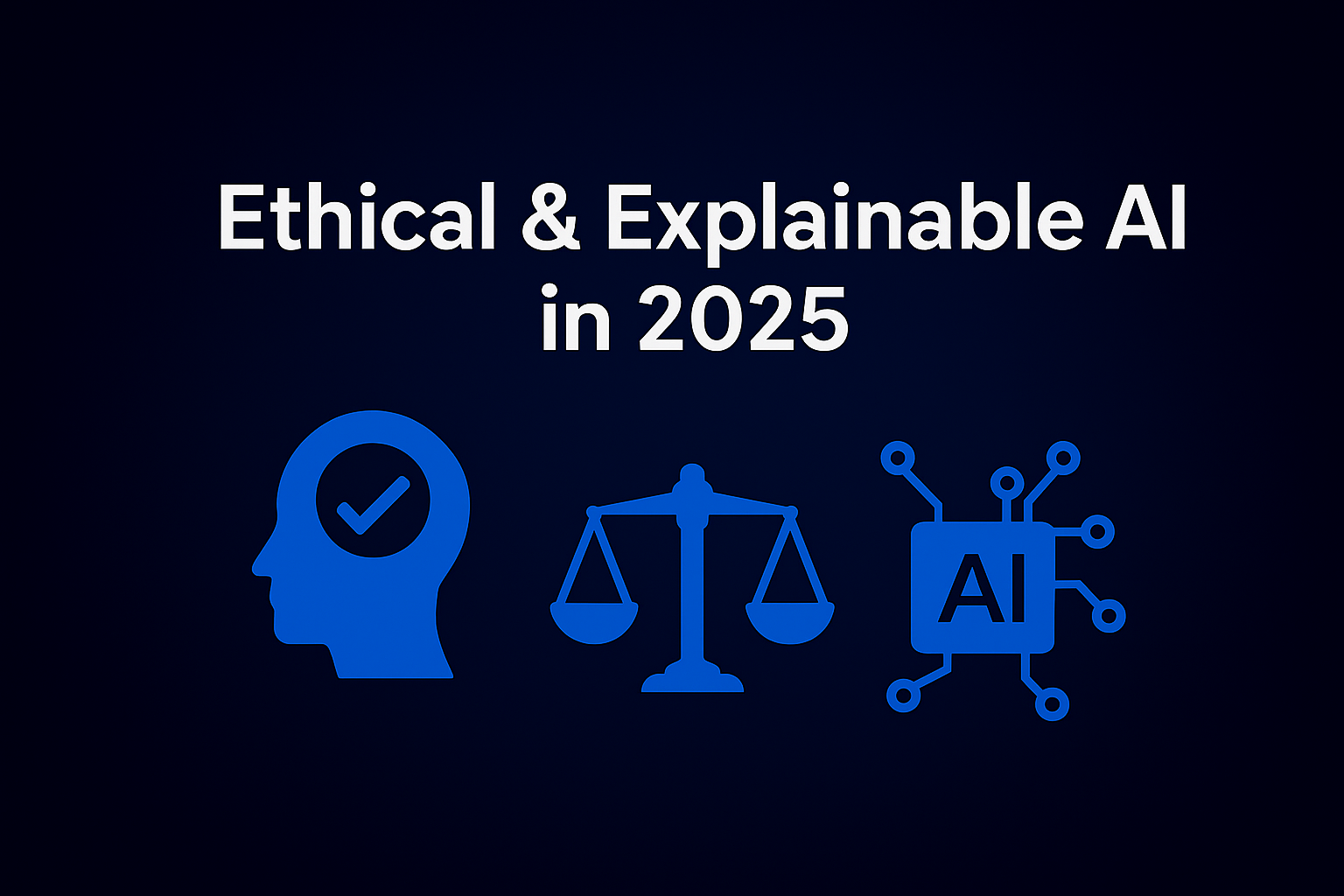Introduction
Artificial Intelligence (AI) is now everywhere — from healthcare to banking to smart homes. But as AI grows more powerful, questions of ethics and trust have also become louder.
In 2025, companies in the USA are not only focusing on how advanced AI is, but also on how fair, transparent, and explainable it can be. Without ethics and explainability, AI risks losing public trust.
What is Ethical AI?
Ethical AI ensures that artificial intelligence systems are fair, unbiased, safe, and used responsibly.
This includes:
- Avoiding bias in decision-making.
- Protecting user privacy.
- Preventing harmful or unfair outcomes.
- Using AI responsibly for the benefit of society.
👉 Just like AI SEO trends 2025 focus on fair search rankings, ethical AI focuses on fair decision-making.
What is Explainable AI?
Explainable AI (XAI) is about making AI decisions understandable to humans. Instead of acting like a “black box,” explainable AI shows why it made a certain choice.
For example:
- In healthcare, doctors can see why AI suggested a certain treatment.
- In banking, customers can know why AI rejected or approved their loan.
👉 This is similar to how AI keyword research reveals why certain keywords rank higher — it makes the process transparent.
Why Ethical & Explainable AI Matters in 2025
- Public Trust – People trust systems they can understand.
- Regulation Compliance – US laws now require AI transparency in sensitive industries.
- Better Decision-Making – Businesses avoid bias and mistakes.
- Social Responsibility – AI should benefit society, not harm it.
(External Source: MIT Technology Review on AI Ethics)
Real-World Applications of Ethical & Explainable AI
1. Healthcare
AI diagnoses patients, but explainability ensures doctors understand how the decision was made. This saves lives while keeping trust intact.
2. Finance
Banks use explainable AI for credit scoring. Customers now get clear explanations for loan approvals or rejections.
3. Hiring & HR
AI is used to scan resumes. Ethical AI ensures the system does not discriminate based on gender, race, or age.
4. Autonomous Vehicles
Self-driving cars must make quick life-or-death decisions. Explainable AI helps regulators and users trust the system’s judgment.
👉 Just like digital twin technology builds virtual simulations for trust in industries, explainable AI builds trust in decision-making.
5. Smart Cities
AI helps manage traffic, electricity, and public safety. Ethical frameworks ensure these systems are safe, fair, and unbiased.
Benefits of Ethical & Explainable AI
- Greater Transparency – People know why AI acts in certain ways.
- Reduced Bias – Fairer outcomes in healthcare, finance, and hiring.
- Higher Trust – Businesses gain customer loyalty.
- Regulatory Approval – Easier compliance with new US laws.
(External Source: Forbes on Ethical AI)
Challenges of Ethical & Explainable AI
- Complex Algorithms – Many AI models are too advanced to fully explain.
- Higher Costs – Making AI ethical and explainable requires extra resources.
- Conflicts of Interest – Companies may avoid transparency to protect profits.
- Lack of Standards – Global rules for AI ethics are still being developed.
👉 Similar to energy-efficient computing SEO challenges, businesses must balance innovation with responsibility.
The Future of Ethical & Explainable AI (2030 Vision)
By 2030, experts predict:
- AI ethics boards will be common in all major companies.
- Explainable AI will be required in healthcare, finance, and government.
- Public trust in AI will increase as systems become more transparent.
- Businesses ignoring AI ethics will lose customers and face legal risks.
(External Source: WSJ on AI Regulations)
FAQs About Ethical & Explainable AI
Q1: Why is AI ethics so important?
Without ethics, AI can harm people by making biased or unsafe decisions.
Q2: Can AI ever be fully explainable?
Not always, but 2025 tools make AI much more transparent than before.
Q3: Which industries benefit most from explainable AI?
Healthcare, finance, autonomous vehicles, and hiring systems.
Conclusion
In 2025, ethical and explainable AI is not optional — it’s essential. AI must be fair, transparent, and understandable to gain trust.
From hospitals and banks to governments and smart cities, explainability ensures AI benefits everyone while minimizing risks.
The future of AI is not only about how smart it becomes, but about how fair and trustworthy it remains.
